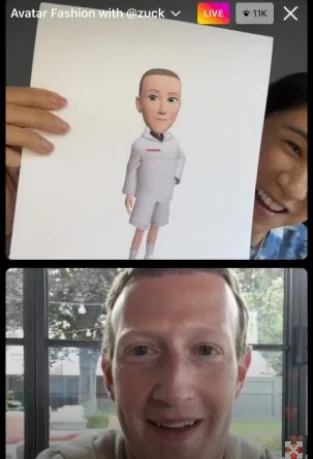Meta in collaboration with some of the top brands in the fashion industry is opening a digital fashion store.

Chief executive of Meta Mark Zuckerberg revealed on Friday afternoon during an Instagram Live event that Balenciaga, Prada, and Thom Browne will collaborate to sell trendy avatars.
In a live conversation with Eva Chen, Instagram’s director of fashion partnerships at Meta, Zuckerberg remarked, “I’m really grateful and proud that these brands are joining us to kick off fashion in the metaverse.”
In the following months, the feature will be available on Instagram, Facebook, and Messenger. Users on Instagram may already create virtual avatars.
“Fashion is, at its core, a form of self-expression and art. “I can’t wait to see what happens from being able to wear Balenciaga, Prada, and Thom Browne,” Chen remarked.
During the Friday chat, Zuckerberg, who is renowned for wearing casual tees in real life, criticized several fashion items that his avatar was wearing. Over time, he says, the idea is to make the marketplace more accessible to creators who want to design new clothing.

Fashion brands and crypto space
In recent years, the fashion industry has been progressively experimenting with Web3 and crypto. This week, The Block covered Tag Heuer’s debut of a watch that displays non-fungible token art, Lacoste’s launch of NFTs, and Dolce & Gabbana’s collaboration with a digital fashion firm.
Many fashion brands have begun to accept cryptocurrency payments via third-party apps. Farfetch, Gucci, and Balenciaga are just a few of the numerous high-end retailers that take cryptocurrencies.
Despite declining floor prices for popular NFT collections and overall crypto instability, the fashion industry is experimenting with Web3 at breakneck speed. This could be a reflection of the industry’s overall long-term outlook.
According to a report released earlier this week by McKinsey, the metaverse could be a $5 trillion industry by 2030, and “consumers see the unique value of fashion within these digital worlds, where creativity, status, and exclusivity, and – most importantly – self-expression play essential roles for all users.”
According to the survey, “about 70% of US consumers already feel their digital identity is as essential as their real-life identity.” “Which is why fashion is possibly the most perfectly positioned industry to shape the metaverse.”
